Russians Really, Really Like Vladimir Putin, And That Makes Ending The Ukraine Crisis Harder
Vladimir Putin has become immensely popular in Russia again, and its not hard to figure out why.
Vladimir Putin may be becoming something of an international pariah in the wake of the downing of Malaysia Air Flight 17, but a new Gallup poll seems to indicate that he has reached new levels of popularity in Russia:
WASHINGTON, D.C. — President Vladimir Putin’s popularity in Russia is now at its highest level in years, likely propelled by a groundswell of national pride with the annexation of Crimea in March on the heels of the Sochi Olympic Games in February. The 83% of Russians saying they approve of Putin’s leadership in late April/early June ties his previous high rating in 2008 when he left office the first time.
The 29-percentage-point increase in Putin’s job approval between 2013 and 2014 suggests he has solidified his previously shaky support base. For the first time since 2008, a majority of Russians (73%) believe their country’s leadership is leading them in the right direction. This renewed faith is apparent in their record-level confidence in the country’s military (78%), their national government (64%), and honesty of elections (39%).
Russians’ positivity also colors other aspects of their lives. While Americans have become less satisfied with their freedom to choose what they do with their lives, Russians became more satisfied in 2014. A record-high 65% of Russians are satisfied with their freedom. Some of this may be attributable to improving economic perceptions. Despite U.S. and European sanctions earlier this year over Moscow’s intervention in Ukraine, more Russians see their economy getting better now than has been the case since 2008. However, the economic outlook still remains relatively weak, with 35% of Russians saying conditions are getting better and 19% saying they are getting worse, and the jobs outlook has not improved.
As this chart shows, Putin’s popularity has returned to the level it was at six years ago, after a period in which it dipped significantly:
There’s a similar phenomenon when it comes to other Russian government institutions, with the exception of the military where public confidence seems to have always been high:
Several thoughts come to mind when looking at these numbers.
First of all, there’s a real question about how honest the responses to these poll questions can be expected to be. At the end of its post, Gallup states that the poll was conducted via face-to-face interviews some some 2,000 randomly selected Russian adults over a roughly six week period. Given the political environment in Russia, one has to wonder how many people are telling the person conducting the interview what they actually thing, and how many are telling them what they think the pollster wants to hear, or what’s safe to say given the political environment in Russia. That’s always a risk here in the United States, of course, but it strikes me that it is likely an even bigger issue in a nation like Russia which has seen a serious clamp down on dissent and opposition in recent years.
Notwithstanding that caveat, it seems fairly apparent that Vladimir Putin is far more popular among the Russian people than it has been in recent years. In no small part, that is likely because he has successfully used appeals to Russian nationalism in places like Crimea and eastern Ukraine, as well as appeals to feelings of Russian nationalism that pre-date the Soviet Union, to divert public attention from a domestic situation that is less than ideal to say the very least. The Russian economy has long been fairly weak compared to the rest of the world, and indeed would be pretty much a basket case were it not for the nation’s oil and gas reserves. While there are certainly plenty of people who have done very well in the years since the collapse of the Soviet Union, most of that success is limited to people with ties to the regime and other centers of power; the average Russian doesn’t have access to those things. Putin, however, obviously has learned the lesson of every authoritarian ruler; that the best way to distract a restless populace is with nationalism and foreign military adventures. And it seems to be working.
Finally, a survey like this suggests strongly that moving Vladimir Putin off his current course of action is not going to be easy. His actions in Crimea and the eastern Ukraine have proven to be immensely popular among the Russian people, and are serving to enhance his own power inside the country and among pro-Russian sympathizers outside of Russia. As long as that’s the case, and Putin thinks he can get away with his continued belligerance, then the current state of affairs in Ukraine is likely to continue. We are already seeing this in the aftermath of the MH 17 crash, in which the Ukrainian separatists are clearly taking steps to control the on-the-ground investigation, and most likely, purge the scene of any evidence that might serve to implicate them in the attack that brought the plane down. Putin, meanwhile, still remains silent, likely as he waits to see how this all begins to play out. In the end, though, it’s unlikely that he will be cooperative unless he sees it as being in his interest, and even then it will be some minimal level of cooperation that will serve to shield Russia from any direct involvement in the murder of 300 innocent people. Given the fact that the Russian media is cooperating in the Kremlin’s efforts in this regard and feeding the Russian people a version of events that, in some cases, has little to do with reality, it’s unlikely that this event is going to do much to harm Putin’s standing among the Russian people.
The logic behind the sanctions that the West has imposed on Russia ever since the annexation of Crimea earlier this year has been the idea that economic pain in Russia will influence public opinion in Russia and thus force Putin to back down from his current course of action. While this does make sense on some level, this poll suggests that the strategy might not work. For one thing, so far there seems to be very little evidence that the sanctions that have been imposed to date have had much of an impact on the Russian economy as a whole, and the fact that the price of oil is currently on an up-tick may help to offset any negative consequences from sanctions to at least some degree. Even if there is an negative impact, though, Putin will likely try to spin that into evidence of anti-Russian animus from the west. This poll suggests that strategy will work. If that’s the case, I’m not sure what we can, or should, do next.
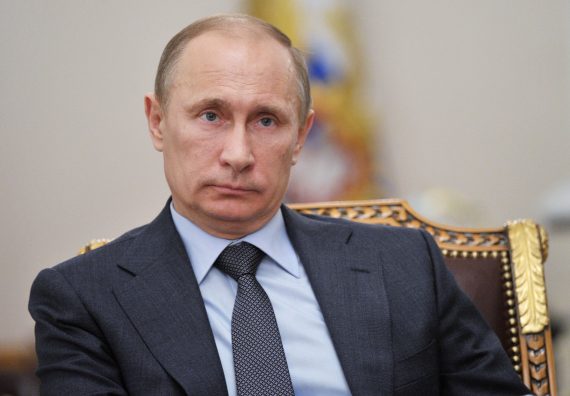
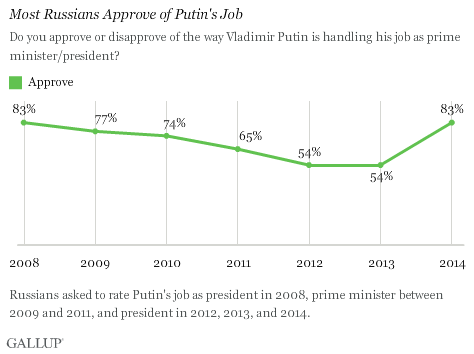
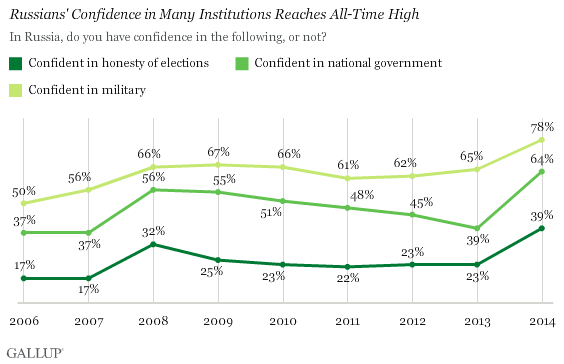


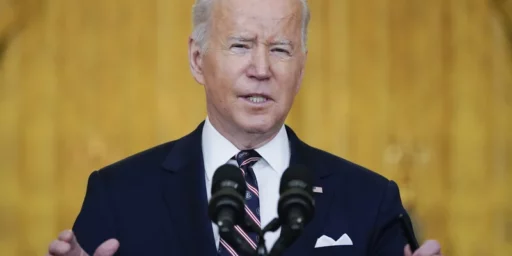


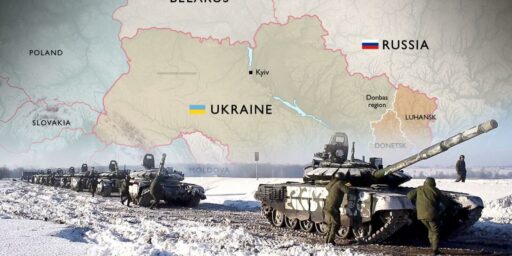
Putin seems very secure on the domestic front. What I don’t quite understand is what happens if the Russian oligarchs start taking a financial hit because of Putin’s actions. My sense is that Putin really holds the power in that relationship but I am not certain. (Dave, Andy, anyone?) Even in the short run Putin is certainly safe since he can ride the nationalist wave and the oligarchs won’t risk going after him. However, a couple of years out when Crimea and eastern Ukraine is just a financial drain, and if growth is slow due to sanctions, what happens if the oligarchs take a run at dumping him?
Steve
The Russians have always been very nationalistic and many of them yearn for the hegemony of the old Soviet Union. It remains to be seen however how his popularity holds up when the Russian economy takes a hit from sanctions and after the downing of Malaysia Air Flight 17 I don’t see how Western Europe can ignore it anymore. As @steve: says the the oligarchs will play a big part in Putin’s future but how long will the Russian people stick with him if the economy is severely damaged by his incompetent recklessness. A good analysis by ALLAHPUNDIT here.
Where has Pussy Riot gone?
@Tillman- Gone to young men* everyone.
*Or young women. Cant tell the AC’s from the DC’s without a scorecard.
Steve
See the US media and the latest Iraq War.
There is nothing like war, conflict, and macho chest pounding to increase the popularity of national leaders. GWB enjoyed a nearly 90% approval rating for a while. I am sure that Netanyuha has a good rating; a muddle through leader like Carter or Obama is scorned.
As long as he has significant public support, the oligarchs will fear Putin. The Khodorkovsky lesson has not been forgotten.
If and when Putin’s Ukraine adventure goes sideways and those numbers will change. The fallout from the Malaysian Airways shoot down will be interesting to track (by accounts I’ve read this morning it looks fairly clear that pro Russian separatists are the shooters).
George W. Bush was immensely popular during the run up to the Iraq War and the “Mission Accomplished” phase, but ended up with 23% approval. I don’t have a crystal ball, but my suspicion is that this is the acme of Putin’s approval and it will be downhill from here. The big get already happened – Crimea. Anything that happens after will be a long term approval sink.
(BTW, what actually did he get with Crimea? A Black Sea port for a sub-par navy sailing crappy ships. I don’t really get this.)
@de stijl:
His friends call it compensation for their Cypriot banking losses
I disagree with many comments above.
Comparisons to Bush and 9-11 are wrong.
Bush’s approval dropped from 90% to 25% because
the public realized that all his military misadventures
we’re unnecessary. No ME country was ever an existential threat
to the US.
Simply put, NATO forces/airplanes/missiles in Ukraine
are an existential threat to Russia. Putin knows this
as do the Russian people. The US has never
come close to such an existential threat.
The failure of Washington to appreciate this
is naive.
Imagine, in 30 years, China used its “soft power”
to elect a pro Chinese government in Mexico and then
built a port for their navy in Baja California. Americans
would apoplectic.
What choice do Russians have? Boot Putin for Pro-Western oligarch
and genuflect to the West. Think about it. It is not going to happen.
Washington is playing with Fire.
RC
Putin has an overall plan in place and Ukraine is one of the first steps. What else is planned is subject to conjecture. I am sure that the Russian people are being fed reports from certain US media outlets giving the views that the US is in full retreat, that it will not get involved, and numbers showing the cuts in our military. What they are not shown are the figures and facts that show a clear US superiority in equipment, training, technology, and reserves.
The US and Germany certainly need to show that they are united and send a message to Putin: stay out of western Europe. There will not be a Chamberlain repeat.
“They ran so fast that the hounds couldn’t catch them, on down the Mississippi to the Gulf of Mexico”(Horton, “The Battle of New Orleans”)
@Robert C: An “existential threat”? Only in the fevered imaginations of those fed on Russian media. I mean, continental Europe includes some of the most war-averse nations on earth. Putin’s little friends just killed 200+ European civilians, mostly Dutch nationals, and are you hearing even weasely little threats from the Dutch, much less the kind of chest-banging that the USA (or indeed Russia) would be engaging in under similar circumstances? Hah. They can’t even decide on whether they want to impose tougher sanctions. “Existential threat” my eye; it’s a feeble excuse for Putin’s self-serving nationalistic manipulations.
@Tyrell:
Provide evidence that Putin/Russia are trying to get into Western Europe.
In fact, it is the West (USA) that is trying to dismantle Russia.
The military superiority you describe is moot. A conflict with Russia could easily
lead to a nuclear exchange. We could not beat Russia. Modern civilization would end
as we know it.
Be careful what you wish for.
RC
@ElizaJane:
Only those fevered imaginations fed by the US MSM would be stoking
the fires for a military confrontation with Russia and view Putin/Russia
as an existential threat to the US.
RC
Consider the reported popularity of Castro, or or that little pop-fart Kim-Jing Il as two examples of how it’s kida hard to NOT be liked when those who oppose one, have a tendency to wake up dead, inexplicably.
@ElizaJane:
*The United States sent divisions to put down the October Revolution for no reason other than we feared workers here would demand an end to their enslavement
*The United States organized a global military alliance to strangle the Soviet Union after 1944
*The U.S. built the largest nuclear arsenal and pointed it at the Soviets without provocation while repeatedly threatening to initiate nuclear war, in each case with the Soviets being the mature party backing down to avoid Armageddon
*We broke the 1990 promise made to Gorbachev that NATO would not expand “one inch” to the East should the Soviet Union let Eastern Europe go
*We broke our treaty obligations and deployed a missile defense system
*We provided advice to “reform” the Russian economy along market lines that reduced output by 40%, shortened Russian lifespans by a decade, created a ruling class of billionaires and turned much of the country’s economy over to organized crime.
*We engineered the overthrow of Ukraine’s government and funded right-extremists in seizing power so as to expand NATO right up to Russia’s borders, something the Kremlin had repeatedly warned us was unacceptable
*Now we have a downed plane and no evidence of Russian or Russian separatist involvement, yet we are again blaming and threatening (you guessed it) the Russians
What choice do they have but a man like Putin? We abuse and take advantage of anyone willing to closely cooperate with us; we laid the groundwork for his control of the country with our obsessive, freakish desire to bring Russia to its knees and now we has a sad because he doesn’t knuckle under whenever Washington raises an eyebrow.
I, for one, am not blaming the Russians. At least not until proof is in.
Much of what you have written evidently came from some university history class, somewhere like Berkeley, CA.
We remember:
Soviet tanks and troops moving in and crushing the people in Hungary, Czechoslovakia, Poland, Baltic states, parts of Asia, parts of Africa, and influence in Central America.
The tragedy and disaster of East Germany and the wall of shame in Berlin. Allied troops had liberated these countries from the Nazi oppressors, only to have the Soviet Union bully their way in after WWII.
Soviet missiles in Cuba – aimed at the US. Many people did not think that they would be alive at the end of October, 1962. Yes, the Soviet leader, Khrushchev, wisely stepped things back: in the face of US military force and determined, decisive leadership in Washington.
Russians move into Afghanistan, 1980’s.
2,000’s: Georgia (see link below)
In all of these countries: freedom movements crushed, peopled imprisoned, killed, tortured. Many were killed trying to get out, to escape the oppression and Soviet slave systems.
Our defense systems, including SAC, patrolled the skies and seas around the clock so that we could remain free.
Soviet economic output suffered because of their own communist controlled economy. In an acknowledgement of total failure, Soviet leaders had to ask the US for wheat.
“Those d______ bas_____ds ! ” (then candidate Richard Nixon, on hearing that the USSR had invaded Czechoslavakia after promising them freedom)
See this link about the Russian moves in to Georgia:
https://www.youtube.com/watch?v=zpR0734iU7w
See also: “Masters of Deceit” (Hoover)
@Tyrell:
Every example you give is, for all practical purposes, ancient history.
The USSR is gone. Period.
Russia has shown none of the tendencies of the USSR.
The USA has been trying to “roll back” Russia for 25 years.
The US has had carte blanche to do what it wants militarily for
50 years. Many of these adventures failed because political objectives,
The reason you go to war, we’re not met. ie Vietnam, Iraq, Afghanistan.
But, militarily, we kicked ass. Russia is not Vietnam, Iraq, or Afghanistan.
Nor will it acquiesce to our wishes like Europe. Russia will fight back.
Russia will not accept NATO (USA) on its borders. The idea that a hot war
with Russia will be kept conventional is laughable. And, I think it’s anybody’s guess who would
Use nuclear weapons first.
Rc
We extended our influence – NATO and other – into the Baltics and Poland in part because the free people of those nations feared Russian thuggery. I can’t imagine where they got that concern Anyone?
The Poles and later the Ukrainians wanted the security and freedom that comes with distance from Moscow. Too many if you ignore that and dismiss the right of association that rightly belongs to those peoples. The Poles and Latvians and Ukrainians don’t wish to be so casually handed over to Moscow just because that will keep Russia’s dictator happy.
@michael reynolds:
Please provide an example of Russian thuggery.
Dictator? Putin was elected wasn’t he? Do you call all elected foreign leaders who you disagree with dictators?
It appears that a large number of Ukranians don’t want to be ruled by the Govt in Kiev….that was put in place by a US backed coup.
Your reference to Poles and Latvians is a straw man. This has nothing to,do with them. The reality is this: the previous gov’t of Ukraine may have been corrupt and a Russian puppet. But, it was democratically elected because a majority of the people within Ukraine voted for the previous president. Because he would not kowtow to Washington, the US fomented a coup.
We spread NATO into the Baltics and Ukraine because powers that be in DC want to role back Russia. “How dare Russia not genuflect to US demands.” The problem is that Russia will not accept Ukraine into NATO. That they won’t is perfectly predictable.
Right of association? Did the US accept the right of Nicarugua to associate with the USSR? Would the US accept Mexico associating with China if it meant a navel base in Cancun?
This is realpolitik and the US/Obama/Powers/Biden are playing with fire.
RC
@Robert C:
An example of Russian thuggery? Backing Assad? Chechnya? Georgia? Crimea? Encouraging gay-bashing, both “legal” and by mob action? Arresting and imprisoning peaceful protestors and political opponents? Shutting down the free press? Refusing to allow an impartial examination of the wreckage from the passenger jet Putin’s bully boys shot down?
You’ve got to be kidding. An example? There are dozens.
Putin freely elected? Yeah, in pretty much the way General Sisi was just “elected” in Egypt. Kind of easy to win when you’ve thrown your opponents in jail, outlawed most political parties, and shut down the press.
No, references to Poles and Latvians are not a straw men. You and others assert that we are being aggressive in extending NATO. NATO is extended in every case because the people in the affected country want it. As it seems the Ukrainian people want it – at least now that Putin has brilliantly subtracted the Crimean voters from the electorate.
You’re buying into a cold war mentality while pretending otherwise. You seem ready to accept a bipolar world in which Poles, the Baltic peoples, Czechs, and yes, Ukrainians, have no rights to choose their own path. These people have rights. They can join whatever organizations they choose to join.
As for the government of Ukraine, what possible business is it of Mr. Putin’s? If it’s wrong for us to attempt the overthrow of Castro, how is it right that Mr. Putin sticks his fingers into a sovereign nation’s politics? That is the business of Ukrainians. Putin has no more right dictating to them than we have dictating to Canada.
Putin committed acts of war against Ukraine. Ukraine has done nothing to deserve this victimization. They have also done nothing to deserve being thrown under the bus by apologists for the punk in Moscow.
@Robert C:
And I can stop paying attention to you now.
Consider reading up on this.
@Tillman: perhaps Robert C didn’t notice, my two examples, but also supposedly elected. I did not chose those names idly.